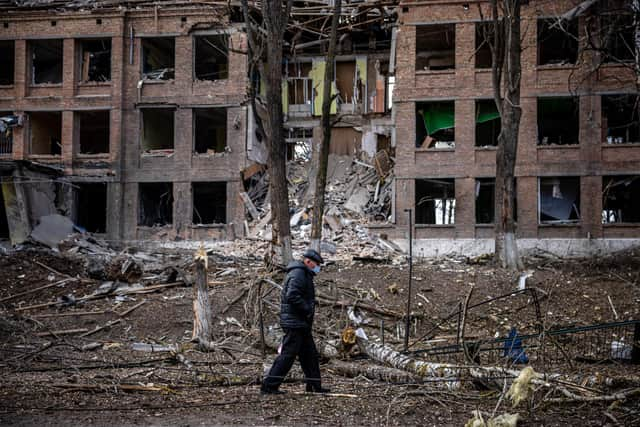Ukraine-Russia: After only seven days, the Ukraine crisis has already reshaped the world
Come the light, Europe awoke to a nightmare it thought it had long left behind in 1945. Roads teemed with refugees, while families hid in underground stations to escape the wrath of an invading force.
Seven days on, the situation in Ukraine has deteriorated rapidly and, with Russia’s tactics growing increasingly blunt and aggressive, it would appear the worst has yet to come.
Advertisement
Hide AdAdvertisement
Hide AdIt has been a week in which the world has already changed irrevocably, with Putin bringing a ruthless end to the Pax Europaea that seemed to promise an endless peace.
The consequences of that will take years, if not decades, to play out. Already, however, the ramifications are being felt far and wide.
The humanitarian fallout has been immense and, as with any conflict, the Russian invasion has scattered families across the continent.
Around a million people have fled Ukraine since those first shells fell. The United Nations predicts that exodus could increase fourfold. The EU’s commissioner for crisis management believes it could reach seven million. These are incomprehensible numbers, and their power lies in the multitude of individual stories.
One woman, Victoria, made it from the western city of Irshava to the Hungarian border. There, she dropped off her two young daughters with waiting relatives, only to return home to help her husband fight. “I don't want it, but we must save our country,” she said.


Further afield, the economic and geopolitical aftershocks of Putin’s invasion are reshaping old norms.
For the first time, the European Union has financed the purchase and delivery of weapons to a country at war, a development that could pave the way for a robust common defence and foreign policy.
The repercussions in some countries have been no less acute. The sight of Ukraine being attacked has led Germany to reverse its ban on supplying lethal weapons to conflict zones, while ramping up its defence spending. It is little wonder Chancellor Olaf Scholz, who has held office for only a few months, described recent days as a “zeitenwende”, meaning a turning of the eras.
Advertisement
Hide AdAdvertisement
Hide AdEqually telling is the summit of European leaders next week, called by French president Emmanuel Macron, to address the “unprecedented challenge” it faces.
“We cannot depend on others to defend us, whether on land, at sea, under the sea, in the air, in space, or in cyberspace,” he said. “In this respect, our European defence must take a new step forward.”
Under Putin, Russia, long tolerated as a revisionist power, is now effectively a rogue state. The new reality poses difficult questions for the west, and Nato in particular.
The threat posed by Russia, not least with Putin’s nuclear sabre-rattling, could strengthen the alliance, given how recent events have brought Sweden and Finland closer than ever before to joining its ranks.
It is already bolstering its military presence across its eastern flank and upscaling its supplies of arms and equipment to Ukraine, but for now, there is no appetite to go further, for fear of inciting a wider conflict.
Yet that conflict may come regardless, especially if Putin decides to retaliate against the raft of sanctions imposed by the UK, EU and US.
In the modern age, that need not constitute military action. The spectre of Russian cyberattacks on governments and businesses in the west is looming, and were Russia to curb exports of oil, gas, grains, and fertilisers, it would have a brutal economic impact closer to home.
This is the reality of conflict in an interconnected world, and it explains why the western response has focused on the most crippling sanctions ever levelled against a G20 nation.
Advertisement
Hide AdAdvertisement
Hide AdIt also accounts for the growing realisation the crisis in Ukraine is deepening the cost of living crisis here in Scotland. The longer it goes on, the more volatile international energy markets will be, meaning higher prices at forecourts and on heating bills.
The question of how long that may be is impossible to answer, and complicated by doubts over whether an increasingly isolated and dangerous Putin has an exit plan.
The 69-year-old is waging war against Ukraine, but also the forces of history, and his demand Nato roll back its presence in eastern Europe will ultimately go unmet.
With a diplomatic solution looking increasingly distant, he looks prepared to double down and intensify the assault, as evidenced by his chilling remark during a telephone conversation with Mr Macron yesterday. “The worst is still to come,” he insisted. It is a course of action that will increase stability and sow further domestic unrest in Russia, where there has been a major clampdown on demonstrations.
Some believe the quickest end to the conflict is an end to Putin himself, and there is every possibility that by seeking to bring about regime change in Kyiv, he will be ousted.
The raft of sanctions against Moscow may not deter him, but the economic pain it inflicts on his people could spark an uprising. Amid speculation that Russia is preparing to introduce martial law, Putin looks prepared for every eventuality – or so he hopes.
What began as a dim rumble in the early hours of last Thursday is now a cacophony heard around the world, and it will reverberate for some time to come.
A message from the editor:
Thank you for reading this article. We're more reliant on your support than ever as the shift in consumer habits brought about by coronavirus impacts our advertisers. If you haven't already please consider supporting our trusted, fact-checked journalism by taking out a digital subscription.
Comments
Want to join the conversation? Please or to comment on this article.
